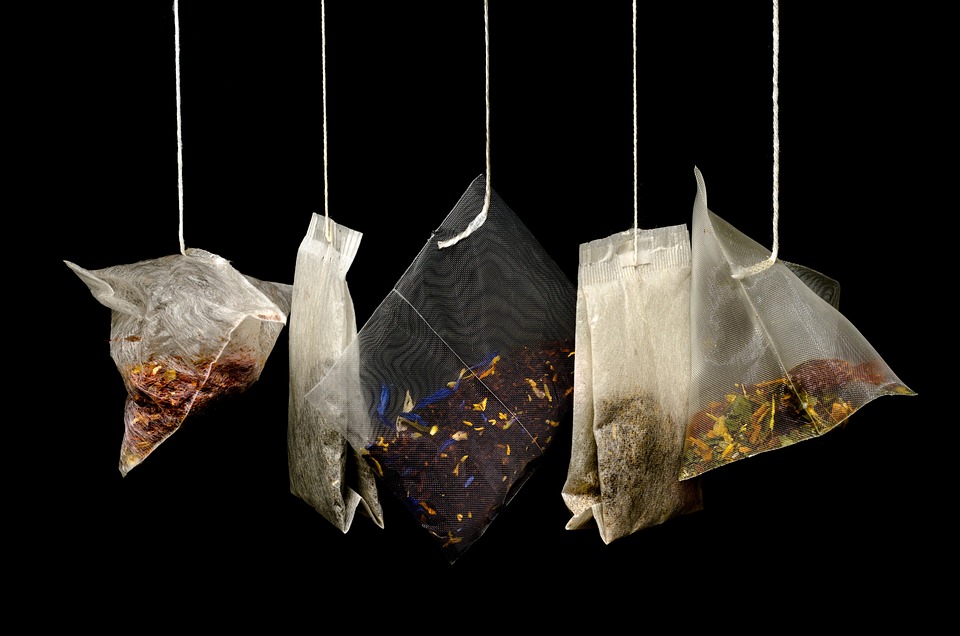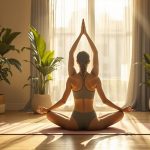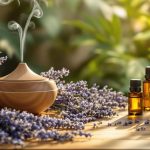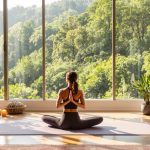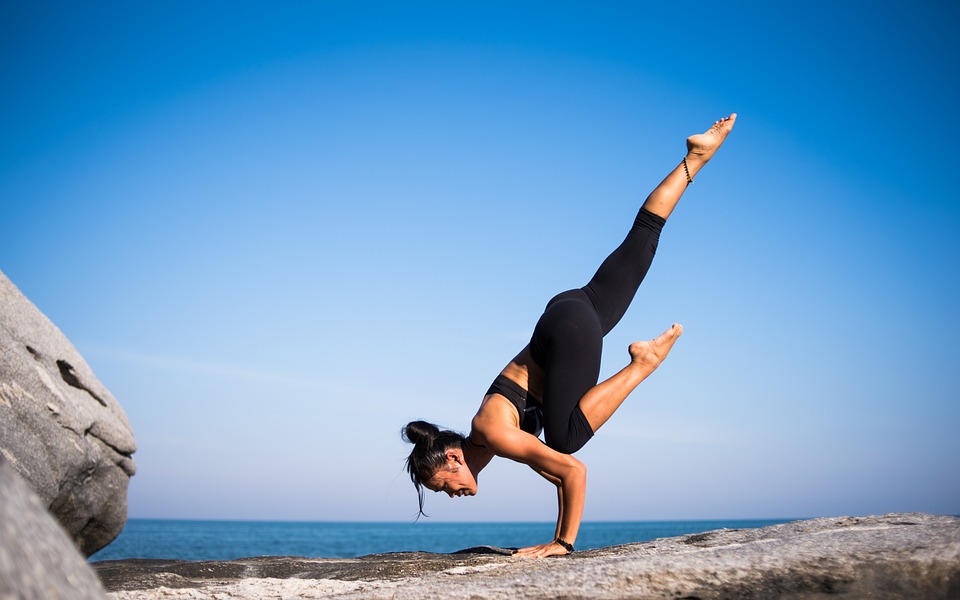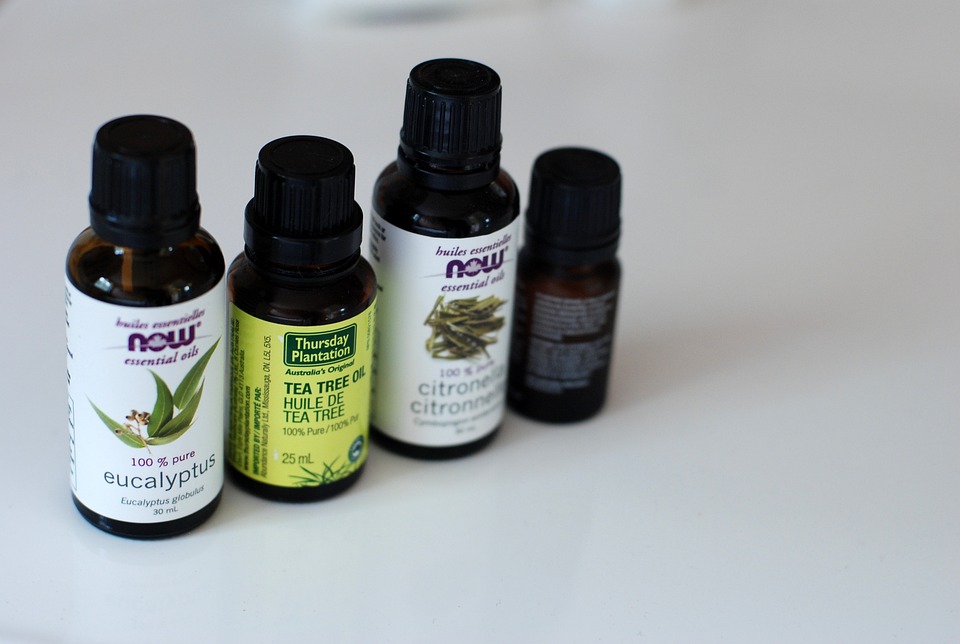
You’re not alone in seeking natural tips to ease anxiety, and there are several effective methods you can try. Regular exercise, like walking or yoga, releases endorphins and improves mental health. Embrace mindfulness and breathing techniques, such as 4-7-8 breathing, to enhance relaxation. Herbal remedies, including chamomile tea and lavender oil, offer natural calming effects. Maintaining a balanced diet and staying hydrated support mental wellness. Prioritize a good night’s sleep and practice meditation to lower stress. Finally, adopt structured thinking through journaling. Explore these strategies further to discover how they can fit into your lifestyle.
Exercise Regularly
Engaging in regular exercise is one of the most effective ways to ease anxiety. When you incorporate activities such as strength training and outdoor activities into your routine, you’ll notice a significant drop in anxiety symptoms. Exercise isn’t just about breaking a sweat; it’s about empowering yourself and reclaiming control over your mind. With high levels of physical activity, you reduce your chances of experiencing new anxiety symptoms by a whopping 27%. Regular exercise also decreases the odds of developing anxiety over time, providing a preventive benefit. Imagine the freedom of a clear mind as you engage in more than 300 minutes of exercise weekly, slashing anxiety symptoms by 36%. When you embrace strength training, you not only build physical resilience but also enhance mental fortitude. Your muscles grow stronger, and your mind finds balance. Regular physical activity can be particularly effective as a preventative measure against anxiety. Outdoor activities take liberation a step further. The combination of nature and movement brings a unique tranquil vibe, melting away tension and stress. It’s not just physical; it changes your brain chemistry, flooding you with mood-enhancing endorphins and anti-anxiety chemicals. Feel the empowerment as you let exercise divert anxious thoughts and lower muscle tension. Making exercise a central part of your life isn’t just about staying fit; it’s your path to mental liberation.
Practice Yoga
Yoga, with its myriad benefits, is a powerful ally in easing anxiety. Imagine letting go of the stress weighing you down, feeling liberated through intentional movement and breath. Yoga benefits extend beyond traditional exercise—it’s not just about flexibility or balance; it’s a pathway toward inner peace. Certain yoga poses have been shown to directly reduce anxiety by helping you tune into your body’s signals. Additionally, regular exercise releases endorphins that significantly improve mood and contribute to stress reduction.
Consider these calming poses:
- Child’s Pose (Balasana): A soothing position that calms the nervous system and invites relaxation.
- Reclined Pigeon Pose (Eka Pada Rajakapotasana): Releases pent-up tension in the hips, which often harbors stress.
- Tree Pose (Vrksasana): Craves your attention, grounding you firmly, allowing anxious thoughts to dissociate.
- Savasana: The ultimate relaxation pose that promotes deep stress release while you surrender to stillness.
Engaging regularly in yoga cultivates mindfulness and fosters an intimate awareness of the connection between your mind and body. Scientific literature supports yoga’s role in anxiety treatment, making it an effective complement to traditional therapeutic approaches.
Embrace Meditation

As you find harmony through yoga’s calming poses, meditation offers another path to ease anxiety. Embracing a variety of meditation techniques can help you conquer anxious thoughts and find liberation. Mindfulness meditation focuses on the present moment with a non-judgmental attitude, enabling you to observe those intrusive thoughts without attachment. Immerse yourself in Loving-Kindness Meditation (LKM) to cultivate compassion and love for yourself and others, countering feelings of isolation and fueling self-awareness. Consistent practice enhances relaxation amidst stress and gradually increases levels of serotonin and endorphins, which are crucial to improving mood and overall mental well-being. Regular meditation practice can induce molecular changes related to stress response and inflammation, further benefiting mental and physical health.
Consider these meditation styles:
| Meditation Type | Key Focus | Benefits |
|---|---|---|
| Mindfulness Meditation | Present moment awareness | Reduces anxiety |
| Loving-Kindness Meditation | Compassion and love | Increases self-awareness |
| Body Scan Meditation | Physical sensations | Promotes relaxation |
| Guided Meditation | Led by teacher/guide | Beginner-friendly |
You can practice Breath Awareness Meditation to anchor your mind with your breath, or try Mantra Meditation, repeating a soothing phrase for concentration. Visualization and Guided Imagery use mental images to reduce stress, inviting peace into your daily life. Regardless of the meditation technique you choose, consistent practice leads to mindfulness benefits, such as lowered anxiety levels, improved cognitive functions, and even reduced blood pressure. Empower yourself on this journey of self-discovery and embrace the serenity within.
Utilize Mindfulness
Mindfulness is a powerful technique that can help you stay anchored in the present moment, reducing anxious thoughts tied to the past or future. By cultivating present awareness, you create space to view thoughts and emotions with emotional clarity, transforming anxiety reflections into something less overpowering. Regular practice strengthens resilience against stressors, enhancing your ability to navigate life’s challenges with composure. Mindfulness exercises can elevate mood and decrease negative sentiments, making it an effective tool for combating anxiety.
Instead of spiraling into worry, mindful observation encourages you to detach from thoughts and see them as fleeting stories, allowing thought detachment and a deeper connection with body awareness.
Engaging in awareness practices offers liberating experiences:
- Sensory grounding: By tuning into your surroundings—sounds, textures, sights, smells, and tastes—you engage all your senses, firmly rooting yourself in the here and now.
- Observing and pausing: When anxious thoughts arise, pausing fosters a mindful response. This break creates a gap to question the truth of these thoughts without magnifying them.
- Mind and body connection: Recognizing how thoughts intertwine with physical sensations helps in understanding that your fears aren’t inevitable realities.
- Being less reactive: By enhancing your perspective, you release the hold of anxiety, responding with clarity and calmness rather than reactivity.
Integrating these mindful techniques grants you greater control over how you experience life, fostering liberation from anxiety’s grip.
Deep Breathing Techniques

Deep breathing techniques offer a simple yet effective way to ease anxiety and enhance your overall well-being. Imagine mastering the art of breathing exercises to liberate yourself from stress. With techniques like 4-7-8 breathing, where you breathe in for 4 seconds, hold for 7, and exhale for 8, you can find profound anxiety relief. Each breath you take becomes a tool to calm your mind and body. Integrating the calming ritual of sipping herbal teas can further enhance the effectiveness of these deep breathing exercises by providing a moment of tranquility.
For a rejuvenating break, practice box breathing by inhaling, holding, and exhaling for 4 seconds each. This rhythmic breathing brings a sense of control and peace. 4-7-8 breathing, as a technique with limited clinical research, helps you promote relaxation by involving long, deep breaths.
Or try diaphragmatic breathing, focusing on expanded belly breaths, not chest, to truly relax. Alternate nostril breathing integrates balance, alternating your breaths for a harmonizing effect. Resonance breathing, with its gentle rhythm of inhaling briefly and exhaling longer, nurtures serenity.
Ensure you’re in a comfortable position with relaxed limbs. Breathe into your belly and let your hands guide the motion. Inhale through your nose, exhale through your mouth.
Merge these exercises with yoga or meditation for amplified relaxation. Let deep breathing be your gateway to freedom and tranquility, easing anxiety with every mindful breath.
Explore Aromatherapy
Aromatherapy offers a natural and soothing way to alleviate anxiety by directly engaging your sense of smell.
Essential oils serve as powerful tools in scent therapy, tapping into the ancient art of using aromas to balance emotions and calm the mind. When you inhale essential oils, they stimulate your olfactory nerve, sending signals that release chemicals like serotonin and dopamine, which are vital for mood regulation. While the exact mechanisms are still being researched, certain scents are known to trigger positive emotional responses via the limbic system, potentially enhancing their calming effects.
Popular choices for anxiety relief include:
- Lavender oil: Calms your mind, reduces anxiety, and helps you enjoy a restful sleep.
- Chamomile oil: Promotes relaxation and reduces stress, thanks to its unique chemical compounds.
- Bergamot oil: Elevates your mood and eases tension, helping you maintain a serene mindset.
- Ylang-ylang oil: Lowers blood pressure, promoting a sense of well-being and tranquillity.
Drink Herbal Teas
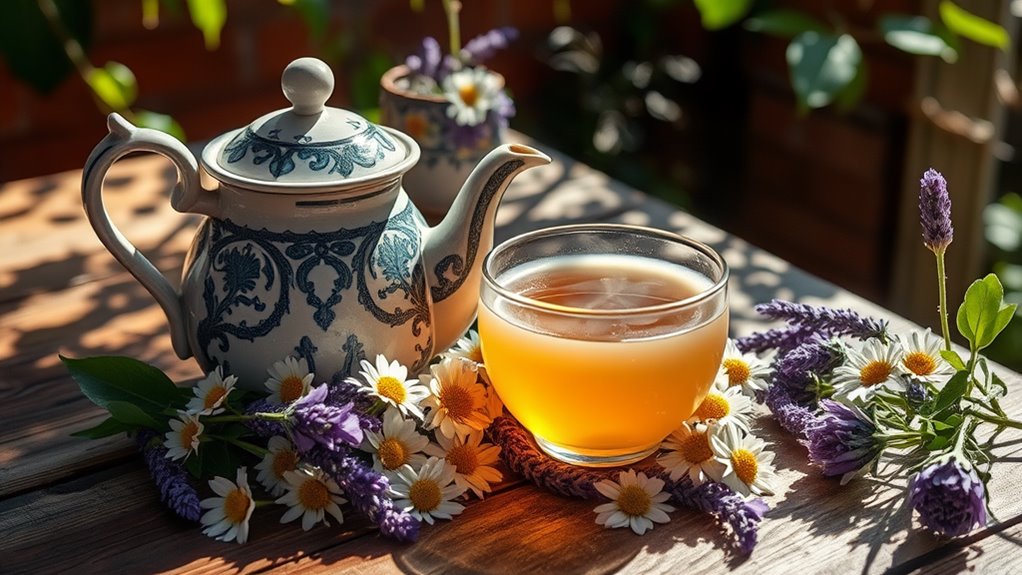
While aromatherapy offers a fragrant path to calmness, sipping on herbal teas provides another soothing approach to manage anxiety. Embrace the liberation from stress by exploring various tea varieties. Chamomile tea, known for its relaxing and sedative properties, not only helps with an upset stomach but also reduces insomnia. Its caffeine-free nature means you can enjoy it any time of day, ushering tranquility into your routine. Consider another potent option, the lavender tea, available in numerous herbal blends. It reduces anxiety symptoms while enhancing sleep and mood, ultimately supporting your liberation journey.
Dive into the world of calming teas with this helpful table:
| Tea Variety | Key Benefits |
|---|---|
| Chamomile Tea | Relaxation, sleep quality, inflammation relief |
| Lavender Tea | Stress reduction, improved mood, immune support |
| Passionflower Tea | Promotes calm, reduces stress and depression, improves sleep |
| Ashwagandha Tea | Combats stress, fatigue, offers anti-inflammatory benefits |
For extensive relief, passionflower tea provides calmness and stress reduction with its antioxidant punch. Finally, consider ashwagandha tea, an adaptogenic herb that fights stress and fatigue. Its anti-inflammatory properties make it a powerful ally in your well-being journey. Enjoy these herbal blends and set yourself free from anxiety’s grasp, one sip at a time.
Try Herbal Supplements
Herbal supplements offer a natural way to alleviate anxiety, complementing other stress-reducing methods like herbal teas and aromatherapy.
They’re an excellent addition to your stress management toolkit, providing a sense of calm without the sedative effects of prescription medication.
By exploring various herbal combinations, you can find a personalized approach that suits your needs.
Consider these potent herbs:
- Lavender: Known for its calming essence, helpful in promoting sleep and reducing anxiety symptoms. Available as essential oils or capsules, it’s often combined with other herbs to enhance effects.
- Ashwagandha: This adaptogen balances stress hormones and supports thyroid function. It reduces anxiety and depression symptoms without overstimulation, making it a balanced choice in capsules, powders, or gummies.
- Valerian Root: Renowned for its sedative properties, it effectively aids anxiety and sleep. Found in teas or capsules, use it short-term to avoid side effects like headache or decreased alertness.
- Lemon Balm: Traditionally used for anxiety and cognition improvement, it reduces insomnia and depressive symptoms. You may experience mild side effects, yet it’s potent in combinations with herbs like lavender.
Embrace your journey toward freedom from anxiety by integrating herbal supplements into your daily ritual.
Maintain Healthy Lifestyle

Incorporating herbal supplements into your routine is a great start, but maintaining a healthy lifestyle is equally important for managing anxiety. Embrace the benefits of regular physical activity. Whether it’s a brisk walk or yoga, exercise releases endorphins, those natural mood enhancers, to combat anxiety.
You’ll find solace in how moving your body transcends stress, lowering those pesky adrenaline and cortisol levels while keeping negative thoughts at bay.
Nutritional balance plays an essential role too. Focus on a diet filled with complex carbohydrates, fruits, vegetables, and lean proteins. These foods boost serotonin in your brain, stabilizing your mood.
Be cautious of processed foods and sugars, which can aggravate anxiety. Remember, hydration importance can’t be overstated; your mental health relies on it. Drinking enough water helps alleviate anxiety and maintains overall well-being.
Don’t overlook the power of time management. Organize your commitments with a planner to reduce that overwhelming feeling. Break down tasks, set priorities, and make sure you’re in control of your responsibilities.
Improve Sleep Quality
To truly improve your sleep quality, focus on dietary interventions that support relaxation and restfulness. Embracing a balanced approach can give you the liberation you crave from restless nights.
Magnesium benefits your sleep by relaxing your muscles and calming your mind. Consider incorporating foods rich in magnesium, like bananas and whole grains, or taking a supplement—but keep the dose under 350 mg unless advised otherwise.
Melatonin effects are profound in regulating your sleep cycle. Drinking tart cherry juice, which boosts melatonin levels, can be a delightful evening ritual.
Explore these dietary enhancements further:
- Glycine: This supplement before bed can enhance your sleep and reduce daytime fatigue.
- Tryptophan: Aim for 1 g daily through foods like turkey, which aids better sleep efficiency.
- Warm Milk: This classic remedy promotes tryptophan consumption, soothing your senses.
- Valerian Root: Ingest up to 600 mg for potential sleep improvement, taking care with its usage.
Embrace the essence of liberation by reclaiming your nights with these holistic strategies. Let your body shift naturally into restful sleep, freeing you from the constraints of anxiety-ridden nights.
Effective Calming Strategies Summarised

Throughout this article, we’ve explored a range of techniques and strategies that can naturally ease anxiety, offering readers a holistic approach to managing their stress levels. Breathing and relaxation techniques like deep, slow breathing, three-part breathing, and progressive muscle relaxation provide effective ways to disrupt the body’s stress response and cultivate a sense of calm.
By focusing on controlled breathing patterns and tuning into the body’s sensations, individuals can mitigate the physiological effects of anxiety. Techniques such as guided meditation and mindfulness further support this process by encouraging awareness of the present moment and fostering a non-judgmental perspective. These strategies are easily adaptable to everyday life, making them accessible tools for anyone seeking to reduce anxiety-related tension.
Equally important are physical activities and distractions that help to channel nervous energy into more productive outlets. Engaging in high-intensity exercises or even simple physical movements such as walking allows for the release of adrenaline and the subsequent reduction of anxiety symptoms.
Simultaneously, finding solace in creative activities, music, and laughter can offer immediate emotional relief by redirecting focus and creating joy. Mental strategies, including acceptance of anxiety, structured thinking through journaling, and guided imagery, provide further psychological support, empowering individuals to face anxiety with resilience and clarity.



